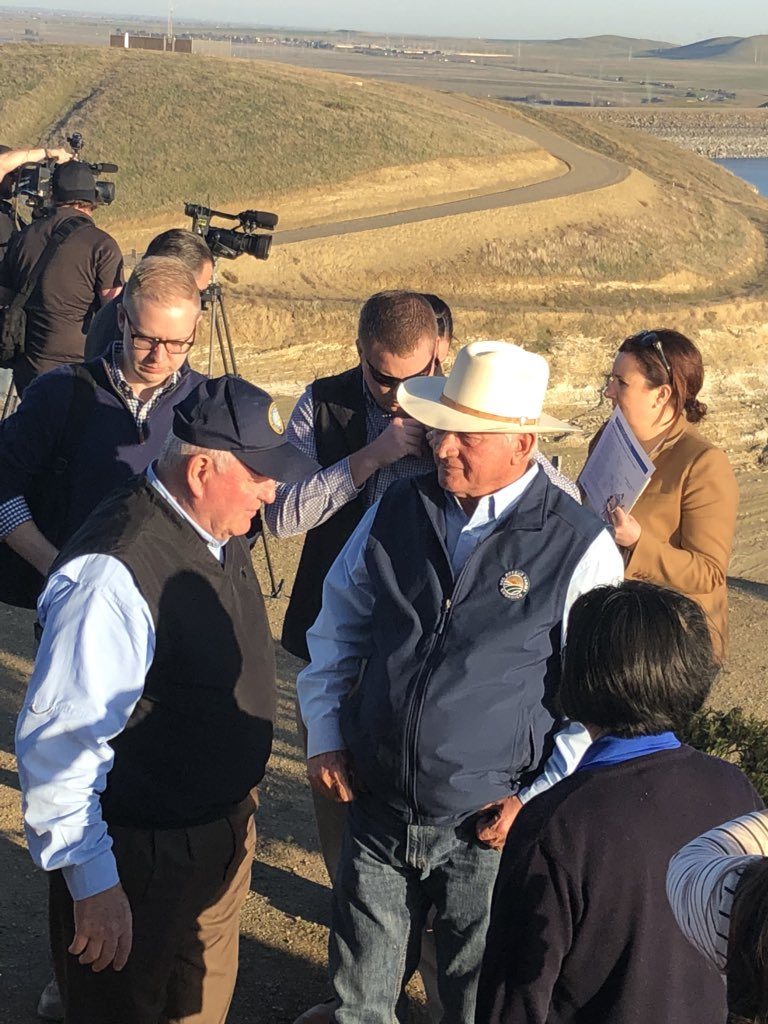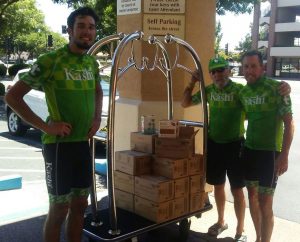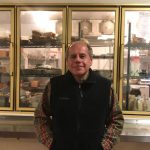
Farm-To-Fork. By: Victor Martino
First Farmer Singular: San Joaquin Valley farmer Joe L. Del Bosque on farming in California and World Ag Expo 2018.
Each February the world of agriculture comes to the world’s largest agricultural region, the San Joaquin Valley, for World Ag Expo. The show, the largest of its kind in the U.S., is a supermarket of information and exhibits on farming, food, and everything related to agriculture. According to the organizers of this year’s show, held in Tulare, February 13-15, around 100,000 people were in attendance.
Thinking about World Ag Expo and its meaning for farmers and agriculture in general in California, I decided to ask a farmer to tell me about his experiences at this year’s show, and what his key takeaways from the big farm show are. My reasoning behind this is asking a farmer offers valuable insight and information for other farmers (as well as all readers) who read my column here each month. Farmer-to-farmer.
My choice of which farmer to ask was fairly easy. Joe L. Del Bosque, who’s based in Los Banos (Merced County) and farms throughout the Westside of the San Joaquin Valley, has emerged in recent years as a farmer-entrepreneur who’s taken a leadership role on numerous issues, ranging from the need for increased water storage in the Central Valley to farm labor and immigration issues.
Del Bosque is also an innovative farmer. He grows both conventional and organic crops, including asparagus (rare in the Central Valley except for the Stockton delta region), melons and almonds. He’s also become a leader in communicating California farm issues to the world, via his Facebook and Twitter social media sites. Many of you might recall Del Bosque as the farmer who brought President Obama to the Central Valley in 2014, an event at his farm that brought national media attention to the challenges of farming in California’s Central Valley.
Here’s what Westside farmer Joe L. Del Bosque told me are the highlights and key takeaways for him from this year’s World Ag Expo. I’m also including some of his thoughts about farming in California, as the show doesn’t exist in isolation from the day-to-day world of farming and California agriculture.
“My most important reason to attend this year’s World Ag Expo farm show was to sit in on a town hall meeting with US Secretary of Agriculture Sonny Perdue,” Del Bosque told me.
“Sonny Perdue is a farmer who comes from Georgia. He’s a very knowledgeable person about agriculture. But agriculture in California is quite different than it is in most other farming regions in the US. California agriculture, with the exception of dairy and beef, is a collection of specialty crops. These crops do not receive supports, or subsidies, like those staple crops grown across the country do, so they are not so dependent on the Farm Bill. Cotton is one program supported crop that is grown in this state, but it is a crop that is shrinking in acreage here. The other major crop that has government support is rice, but rice farmers, like many California farmers, are growing specialty rice for premium markets. That is what has happened with cotton. California now grows more pima cotton, extra long staple quality cotton, that doesn’t receive subsidies.
Secretary Perdue traveled throughout the San Joaquin Valley this week to learn more about California agriculture. He visited fruit packing sheds, vegetable farms, nut farms, and dairy operations. He also visited San Luis Reservoir. California agriculture is a very complex and diverse industry, as I’m sure he discovered.”
More from Farmer Joe on Farmer Sonny:
Additionally, Del Bosque, who spent time with the Secretary of Agriculture on his visit, told me that like other past ag secretaries, Perdue heard about many issues pertaining to farming in California that are not commonly brought up by farmers who farm elsewhere around the country.
“One can’t talk to a California farmer and not hear about water,” Del Bosque said. “Drought, water shortages and environmental restrictions preventing water deliveries are probably the top hot issue for farmers in California because without water we can’t grow crops. Water weighs heavily on our minds each and every year, and we’re starting to get weary,” Del Bosque added.
“Most of the water restrictions coming are due to federal laws protecting endangered species, so it was only fitting that us farmers reached out to our U.S. Secretary of Agriculture for help while he was visiting the Central Valley. But this is not in the USDA’s realm, so Perdue may look to other cabinet members for help on this, namely the Department of the Interior and the Department of Commerce. At my meeting the next day with Secretary Perdue at San Luis Reservoir (in Santa Nella near Los Banos), this is what he told me”. Bottom line: “Farmers in California want him to find some money in a proposed infrastructure bill for more water infrastructure in California.”
At the town hall meeting with Secretary Perdue: Del Bosque told me at the town hall meeting there were some comments about immigration and farm labor. Not all farmers seemed as concerned about this as he is, he noted.
“But fresh fruit and vegetable farmers like me and many others take an acute interest because of the large labor needs required to harvest these crops in California,” Del Bosque said.” An immigration reform plan that does not consider agriculture could cripple the fresh crop industry here in California. There are hundreds of thousands of farm workers in this state without proper documentation, and there is a need to replenish these workers as they retire or migrate out of the workforce.”
Del Bosque’s closing comment to me is something I think all of us, not just farmers and others in agribusiness, need to give serious thought to.
“It’s no surprise that most of the comments at the town hall meeting with Secretary Perdue came from the dairy industry,” he said. “The World Ag Expo is centered in two of the top dairy farming and processing counties in the nation, Tulare and Kern. This (dairy) industry seems to be in trouble. Rising costs, government price controls, environmental regulations, and possibly lagging demand have made life difficult for dairies, even the largest and most efficient ones. Dairy products were the largest crop by value until last year. Nuts, due to high demand, are now tops, which brings up another issue ailing dairies, and most agricultural products — trade. Protectionist policies, ever since Obama’s administration, are attempting to shut down free trade. Gone is TPP, and on the chopping block is NAFTA. U.S. farmers, being extremely efficient, produce in excess of domestic consumption in many crops. They have developed and now have a great share
of export markets. Republicans have been allies with farmers on free trade in the past, but farmers are now finding themselves in an awkward position with the Trump administration. This is a serious issue that we all as farmers and eaters must address.”
(Note: In my February column, “Reinventing Dairy,” I discuss many of the issues dairy farmers are facing, along with offering solutions.)

Certified Transitional Organic: Help from Kashi for farmers interested in organic
Retail sales of organic fresh produce and food products are growing at a rate of 9-10% annually in the U.S. In contrast, sales of conventional food products are growing at about 2%. For farmers, organic offers an opportunity to increase margins, which is why many California farmers, like Joe L. Del Bosque, grow both conventional and organic crops.
A serious problem for farmers with organic though is the certification process, which requires leaving conventional cropland fallow and thus non-productive over a period of three years as part of the government organic certification process.
But there are alternatives. One, Certified Transitional Organic, offers farmers a way to grow crops on land in transition from conventional to organic, thus generating income during the multi-year organic certification process.
Last summer I met up in Modesto with a group of employees of Kashi Foods, the natural and organic food brand owned by food industry giant Kelloggs. The Kashi crew had stopped off in Modesto as part of a multi-state bicycling tour to promote a new product, Kashi Certified Transitional Organic Chewy Nute Butter Snack Bars. The almonds used in the product are grown by Turlock-area farmer Richard Gemperle, who in partnership with Kashi is converting some of his conventional almond acreage into organic. Gemperle is able to grow almonds in this orchard with the help of Kashi, selling them as :transitional organic to the company for use in the snack bar product.
A representative from Kashi told me in late February they are expanding the program, which might present opportunity for farmers looking for a way to transition some land to organic while still generating income during the three-year period when they normally would be unable to produce. Kashi is launching a new product, Kashi Certified Transitional Cinnamon French Toast Cereal, and has other transitional organic products in the pipeline.
Since the start of its program, farmers have received more than $1 million in premiums (above prices paid for conventional crops) through the Kashi Certified Transitional farmer support program, to speed and ease the transition to organic. Additionally, to date more than 4,200 acres, much of it in California, will supply the ingredients produced by partner-farmers for the brand’s certified transitional organic food products. This is a 400% increase since the start of the program in 2016 — and with its expansion, Kashi expects this to increase.
California farmers interested in the program can contact Kashi’s Senior Director of Supply Chain and Sustainability, Nicole Nestoiko, at the company’s headquarters in Solano Beach, California. Go to their website at: www.kashi.com.

California is king when it comes to agtech startup funding
A whopping $2 billion has been invested in California agtech (also called precision farming) since 2010. To put this in proper perspective, Golden State agtech startups received more funding from investors during this seven-year period than all the agtech startups combined did in the other 10 states that also received agtech investment.
One of the areas receiving serious funding is indoor farming. For example, San Francisco-based startup Plenty recently raised $200 million from the big financial institution Softbank’s venture capital arm. Other indoor farming startups are receiving tens of millions in investment from venture capital firms and other investment houses. Indoor farming is in its infancy — and it certainly isn’t going to replace conventional farming anytime soon — but it’s not to be laughed at either. Technology is enabling ways of growing crops that were unimaginable just five years ago. In Europe, two supermarket chains are even growing greens and herbs right inside store produce departments, using specially-designed high-tech mini-greenhouses. In the U.S., startups like east coast-based Bright Farms are supplying supermarkets like Whole Foods and Wegmans directly with lettuce, herbs and a few other fresh produce items, all grown inside high-tech greenhouses.
Other agtech sectors raising big money include startups that are focusing on predictive measures for crops, such as weather, crop quality and the like, along with startups focusing on robotic crop-picking devices. Startups in this sector are getting a lot of attention and investment money from Silicon Valley venture capital firms right now because of the immigration debate and the decreasing availability of farm workers. Automation is seen as the likely alternative to a future with fewer migrant farm workers being available, particularly in California. There are challenges with this technology. But that isn’t stopping agtech startups and those who invest in them from moving forward in a big way. I expect 2018 to be the biggest year yet in terms of total dollar investment in agtech, with the Golden State continuing the lead the way.I.

Leading the way: The Salinas Valley Agtech Summit
On March 27th at Hartnell College in Salinas, farmers, growers, suppliers, ag educators, technology companies, investors and others will be coming together for the fifth annual Salinas Valley Agtech Summit, which has become one of three key events in the fast-growing world of agricultural technology. Increasingly, farmers are attending this event, as many are seeing that they need to keep up with the fast-paced world of technological innovation that’s occurring. the agenda for this year’s summit, along with how to register, is available at svagtechsummit.com.
The top three issues impacting farmers in California
I’m looking for feedback from readers, particularly farmers, on what you think are the three top issues impacting farmers today in California. The issues that have the potential to make and break farmers in the Golden State. Issues that need to be addressed, and resolved now, be they of a political, economic, land-use, natural resource or other nature. I’ll incorporate these priorities into my column. These issues – immigration, water, production costs and others – will be grist for the discussion mill, as we try to make an impact by communicating California agriculture to each other and to the world here at AgExpo Magazine. Send your ideas to me at: victormartino415@gmail.com. I’ll reply to all.

Victor Martino, Ag Expo Magazine’s new columnist, writer and analyst, is founder and president of San Francisco and Modesto-based Third Wave Strategies, a strategic marketing, business development and communications firm specializing in the food, grocery and ag industries. He’s also a columnist and writer for the global food industry publication just-food, a food industry analyst, and an entrepreneur. Martino was born and raised in the Central Valley.
Email: victormartino415@gmail.com.
Twitter: www.twitter.com/nsfoodsmemo
